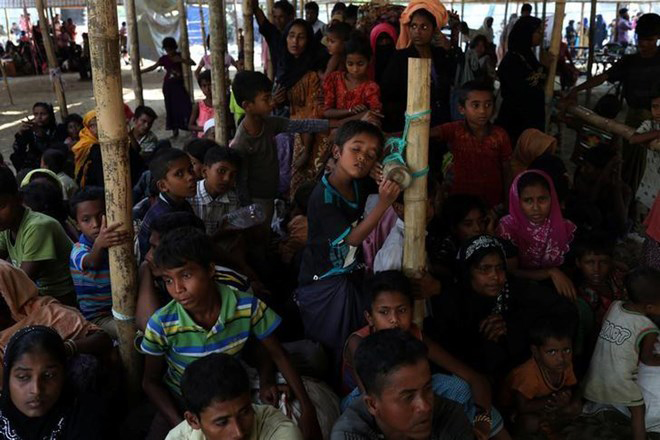
Myanmar and Bangladesh have agreed to take assistance from the United Nations High Commissioner for Refugees (UNHRC) to repatriate hundreds of thousands of Rohingya Muslims from Bangladesh to Myanmar.

Rohingya refugees wait at a relief
centre after crossing the Bangladesh-Myanmar border in the Teknaf area,
Bangladesh, November 23, 2017 (Photo Reuters/VNA)
Bangladesh Foreign Minister Abul
Hassan Mahmood Ali said on November 25 that the three sides will establish a
joint working group within three weeks to fix the terms for the repatriation of
Rohingya Muslims.
The priority is to ensure safety, he said, adding that Rohingya people will initially
have to live in temporary shelters or camps after their return to Myanmar from
Bangladesh.
On November 23, the two countries signed an agreement on the repatriation
process of Rohingya Muslims, which is expected to start in two months.
Some 620,000 Rohingya people had to flee to neighbouring Bangladesh after
violence broke out in Myanmar’s Rakhine state on August 25. Rohingya militants
attacked 24 police posts and a military base, leading to the government to
respond with a security campaign. Clashes have killed at least 110 so far.
Source: VNA
The first summit between the European Union (EU) and the Gulf Cooperation Council (GCC) in Brussels, Belgium, marked an important step forward in their bilateral relations.
The 45th General Assembly of the ASEAN Inter-Parliamentary Assembly (AIPA-45) opened in Vientiane on October 19.
Many countries are grappling with rapidly aging population. As population aging becomes an irreversible global trend with significant impacts on economic and social sectors, nations face the urgent task of creating flexible policies to adapt to and make the most of this trend to build prosperous and sustainable societies.
With a series of stimulus measures, the world tourism industry is on the way to recovery as before the COVID-19 pandemic broke out. Facing the opportunity to take off, the "smokeless industry” is expected to strongly contribute to global economic growth while promoting potential and cohesion, contributing to peace and sustainable development.
The danger from the COVID-19 pandemic is still latent, threatening people’s health and lives in the context that the immunity provided from the COVID-19 vaccine has decreased. Many other dangerous diseases are also likely to break out when the global vaccination rate slows down, due to inequality in access to health services, vaccine hesitancy, and consequences of economic recession.
The Association of Southeast Asian Nations (ASEAN) is witnessing a rise in the sales of electric vehicles (EVs) in Vietnam, Malaysia and Indonesia, according to Maybank Investment Bank Research (Maybank IB Research).



